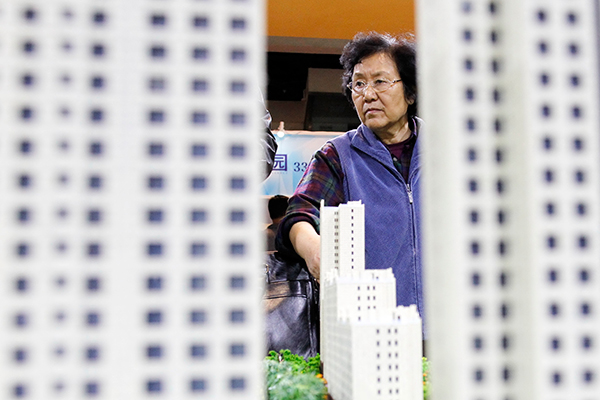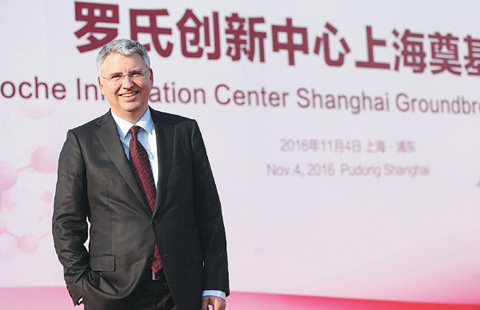New property curbs begin to bite at last
 |
|
A visitor examines a property project model at a real estate expo in Beijing. [Photo/China Daily] |
Actions taken by policymakers to rein in asset price bubble looks to be getting traction
The push by China's policy makers to rein in property bubbles looks to be getting traction, according to early indicators from the nation's biggest cities.
Beijing home sales volumes plunged 41 percent year-on-year last month while Shanghai's slumped 18 percent, China Real Estate Information Corp data showed, after new purchase restrictions tightened mortgage lending. Transactions fell 50 percent in smaller cities.
Now policy makers must balance deflating property prices with safeguarding overall economic expansion. Efforts to curb excessive gains could cut 0.6 percentage point from 2017 economic growth, and as much as?one point with aggressive national tightening, according to Morgan Stanley.
"Property construction will unlikely be a big support for the economy next year, as both sales and investment will decelerate," Wang Tao, chief China economist at UBS Group AG, said in a news conference call. Sales will continue to slow and investment growth will remain moderate for the rest of this year, she said.
Market friction could complicate the situation. Developers and homeowners have been slow to reduce prices while potential buyers are holding off because of hopes for discounts. Economists expect the standoff will last through the end of this year before weak sales gradually drag down home prices and start to weigh on investments early next year.
Developers staying on the sidelines have led to supply and transaction shortfalls. Total new property entering the market in October plunged 61 percent from a year earlier in Beijing, Shanghai, Guangzhou and Shenzhen as developers sharply slowed sales, according to CRIC.
Rising costs amid higher down-payment requirements forced some buyers to walk away from deals. Rinko Zhang, a 30-year-old magazine editor, found out first hand.
Zhang listed her 45-square-meter one-bedroom south Beijing apartment on Sept 20 after finding a two-bedroom unit closer to work. Interest was strong, she raised the price, and a buyer agreed to an Oct 5 signing. But they stood her up, and her agent said the buyer couldn't afford the new higher down payment. Now she says interest in her unit has dried up.
New curbs are biting just as all key gauges on the national economic dashboard turn green. China has posted three straight quarters of 6.7 percent growth, four years of factory-gate deflation have drawn to a close, and two main manufacturing indexes are at two-year highs.
"Policymakers are afraid that if they push too hard, they'll prick the bubble and steer the economy into recession," said Shen Jianguang, chief Asia economist at Mizuho Securities Asia Ltd in Hong Kong. "By deflating it gradually, risks are lower."
Policymakers are encouraging different cities to tailor their actions then watch and wait instead of resorting to a broad national monetary tightening as in the past, Shen said. "They're trying to avoid repeating the chaos like last year's stock rout."
It's a challenge for the central bank as interest rates are too blunt a tool, and there's an imbalance. Fevered buyers are pushing real estate prices to stratospheric heights in major cities, while some smaller cities still have vast town developments standing empty.
Curbs may soon weigh on fixed-asset investment, a sector underpinning economic growth this year, and real estate services, which grew fastest in the booming services industry in the first three quarters, China International Capital Corp economists Liang Hong and Eva Yi wrote in a report. If developers expect weaker housing prices, the latest uptick in real estate investment may lose momentum, they wrote.
Property investment has slowly recovered this year as big city home sales soared. Investment in development has picked up from a six-year low, accelerating to 5.8 percent growth in the first nine months of this year from 5.4 percent in the first eight months. But new starts, a leading indicator of investment, fell 19.4 percent year-on-year in September after a 3.3 percent gain the prior month, calculations based on official data showed.
Bloomberg























